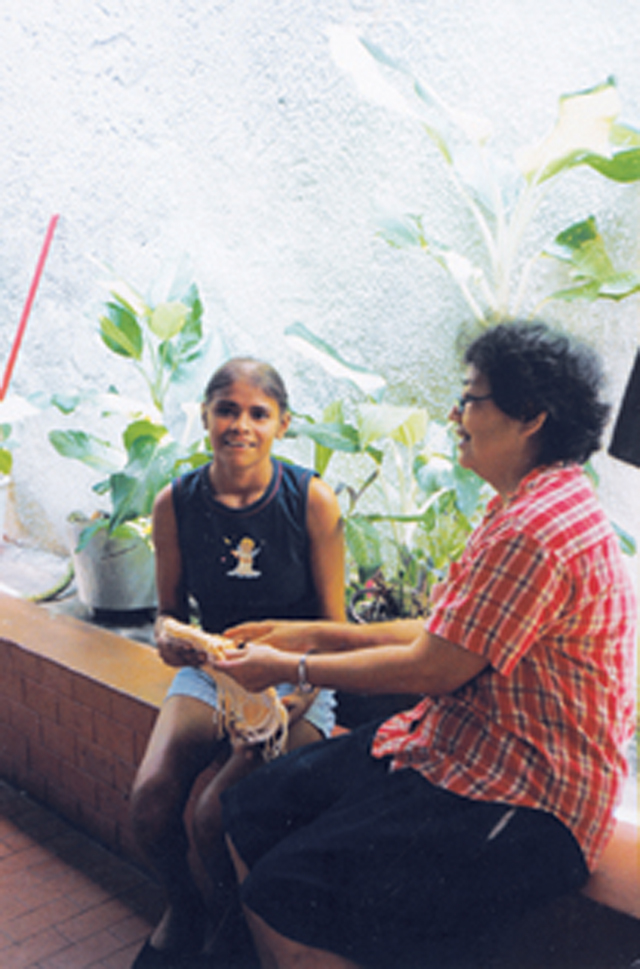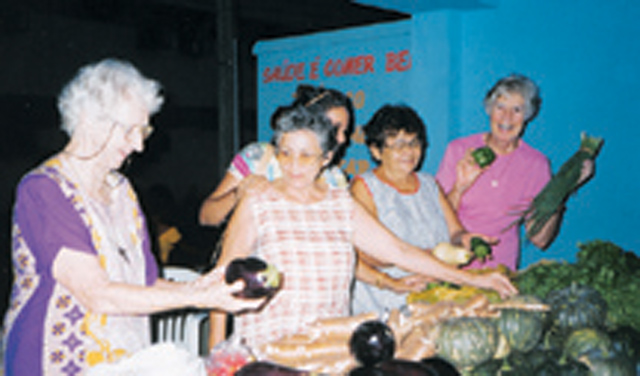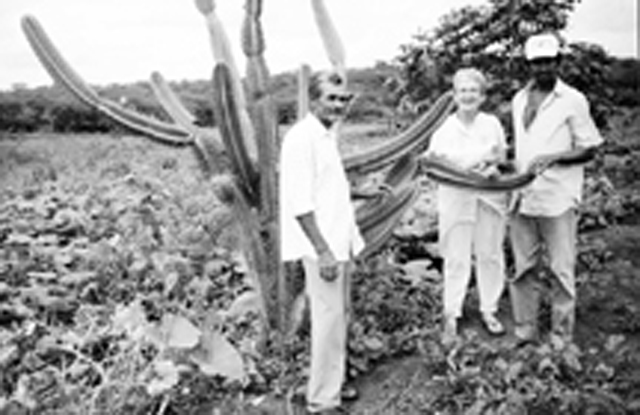A time for change
By Sr. Clarice Garvey, OLM
Summer 2001
Return to Table of Contents
Print Article
Raimundo and Nilda have been friends of ours for many years. Recently when I visited them they told me of how their children, Ana who is nine, and Moses seven, have begun to take an interest in the family garden. They can be heard chatting together or with their friends about the vegetables they plant and like to eat, and how important it is that they eat vegetables every day in order to grow big and strong. Words like “organic” and “vitamins” have become part of their vocabulary.
These changes did not come about suddenly, nor by chance. They are the result of a gradual process of awareness that began some time ago in their small community in the municipality of Ocara.
We first introduced this group to our readers in the 1980s as “the people of Bu” in the parish of Palmácia where several of our Sisters lived. These 14 families protested the injustice of giving half of their crop to the landowner and for this were expelled from their homes in 1988. They were forced to live for some time among family and friends who shared their small homes with them. Later they were given an abandoned farm by the state government as a token sign to people that the government really did have plans for agrarian reform.
These families struggled through drought and crop failure and also enjoyed seasons of wonderful harvest. They always remembered to celebrate in gratitude the anniversary of their arriving on the land they choose to call “New Lives” (Novas Vidas).
During these past 13 years, the people of Novas Vidas have had training sessions in agricultural planning, production and marketing, offered them by other farmers who generously share their experiences. Through these courses the people of Novas Vidas learn more about the soil and how to nourish it. They learn also about the poisonous content of chemical fertilizers and of the danger to the health of their families as well as to the very land they love so dearly.
Since these families began organic farming, they have experienced the wonderful taste of vegetables from their own gardens.
Also the Land Pastoral Committee of the Archdiocese of Fortaleza, of which I am a member, shares Scripture and Creation Spirituality studies with them. These courses help strengthen their faith and enable them to become more responsible citizens. They have acquired a better understanding of creation as the place where God lives, and have become aware that they share in the responsibility of caring for the Earth and in providing food for humanity.
Their reflection on God’s promise to Abraham and Sarah with the blessing of family and land, as well as the writings of Thomas Berry and others, have deepened their understanding of the intimate relationship that exists between them and the whole universe.
Since these families began organic farming, they have experienced the wonderful taste of vegetables from their own gardens. They feel the difference in their own energy levels and see it in the faces of their children who now glow with health.
For me it is a privilege to be back in Brazil, living and working with people who call me to a life of simplicity. People like Raimundo and Nilda welcome me into their homes, share so gently and freely what they have, and then send me off to visit others, carrying with me the goodness and sincerity of their lives. This is Good News indeed!
People power in Canada
We would like to say “thank you” to the people who wrote to the Canadian government about its refusal to fund a project in Brazil to help young people get off drugs. The project has been reviewed and approved by the Canadian embassy in Brasilia, the capital. Isn’t it wonderful to know we can make a difference?
Our Lady’s Missionaries
Fortaleza, Brazil
Blessed by sharing
By Sr. Lucia Lee, O.L.M.
 Sr. Lucia Lee (R), an occupational therapist at the Cancer Institute in Ceará, Brazil, with Claudinha, a patient at the Institute. Claudinha proudly shows the handbag she has woven.
Sr. Lucia Lee (R), an occupational therapist at the Cancer Institute in Ceará, Brazil, with Claudinha, a patient at the Institute. Claudinha proudly shows the handbag she has woven.
One of my ministries is doing occupational therapy at the House of Support at the Cancer Institute of Ceará. This house is for patients coming from the interior of the state for treatment. They might be required to stay for one week, one month or even up to six months. Sometimes patients come with someone to help them with their personal needs. At times there are patients with no one to help them. At the beginning they are often very frightened, but soon they feel reassured of assistance by the people around them. Then they feel at ease and at peace.
My work consists of visiting the patients, talking and listening to their stories and teaching them some artwork. There are constantly new patients coming in and others going home.
Claudinha is a 19-year-old woman, married with one little daughter. She has cancer of the brain and was operated on recently. When she was first admitted she was anxious and naturally very preoccupied about her illness. Later I approached her and asked her if she would like to make some handicrafts. Her immediate response was that she did not know how, but after encouraging her and showing her some of the finished products, she was willing to try. We started with some very simple things but later when she and her husband saw the handbag that she had made, they were surprised and very proud. At this point the husband also started making some crafts.
The patients are always very appreciative of what they have learned and they even say that their new skills will help them to add a little to their income when they go home.
What I give is so little in comparison with what I receive. Just to see their smile, radiating peace, joy and happiness, is the greatest reward I could ever hope to experience. I am very grateful for the opportunity to share my time and skills with people whose situation calls me forth to be understanding and compassionate.
She wheels her wheelbarrow
By Sr. Pauline Doherty, O.L.M.
 Sr. Pauline Dohert (left) and Sr. Mary Hughes (far right) with women of Novas Vidas, buying vegetables grown on the community’s organic farm. Brazil. Sr. Pauline and Sr. Mary, both in their 80s, are still active in mission.
Sr. Pauline Dohert (left) and Sr. Mary Hughes (far right) with women of Novas Vidas, buying vegetables grown on the community’s organic farm. Brazil. Sr. Pauline and Sr. Mary, both in their 80s, are still active in mission.
Eliane is a young woman, the mother of two little girls aged two and four. The father abandoned them, so Eliane makes a living by wheeling her borrowed wheelbarrow, collecting pieces of iron, tin, newspapers and so on, and selling them by the kilogram. She is a tiny little woman of about 90 pounds, but very strong.
She visits me from time to time saying that she needs to do more to earn extra money to buy milk and other necessities. One day she told me she was going to sell clothes and asked if I would give her some. Since I always have more than I need, now and then I am glad to give her a few items of clothing.
Even though Eliane cannot read or write and doesn’t know her parents, she is very courageous. I thank God for the blessing of knowing Eliane with her example of courage and strength.
Life is changed
By Sr. Mary Hughes, O.L.M.
Francisco was one of the young male patients in St. Joseph’s Hospital in Fortaleza. He was a hemophiliac and had received several blood transfusions. He had begun to lose weight and frequently felt great exhaustion. When I met him he was being admitted for a general health check-up. Naturally he and his family were very anxious.
During my usual hospital visitations three times a week, I would always drop in to see Francisco. He enjoyed having visitors, but because his family was poor and lived in the interior of the state, few people came to sit with him. He told me he liked to read and that as a student his favourite subject had been geography. He knew quite a lot about Canada and liked chatting about the places he knew from reading. I was able to appreciate his interest and share with him some of my experiences.
One day when I arrived he told me he had tested positive for HIV. I said a few gentle words to console him but I felt frustrated, knowing that words seemed so empty at such a time.
As with many patients, Francisco was sent home several times with medications, only to be readmitted. On each readmission, I could see he was becoming increasingly weaker. One day when I arrived on the ward, a nurse told me he was paralyzed from the waist down. From that time on he was unable to attend the Mass that was celebrated each week for the patients and which had always been a special moment for him. Francisco’s family was called and he was given the Sacrament of the Sick. A short time later he died.
I have many pleasant memories of my visits with him. Even though he was seldom without pain, he was always peaceful and had a lovely smile. I feel it is a great privilege for me, as a hospital visitor, to be present to people during times when they are most in need of compassion. Their courage and hope are a constant inspiration to me and I come away with a sense of gratitude to God—gratitude for the gift of life, and gratitude for my faith that tells me that this life is not taken away, but only changed.
Return to Table of Contents
Print Article
